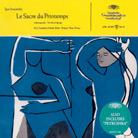October 2005
The recordings have been released in a new series devoted to DG recordings from the 1950s. In the past, DG’s vinyl-era recordings suffered greatly when transferred to CD. Witness the Galleria series, a good idea on paper that often bore rotten fruit. This disc shows one what all the early excitement regarding the DG label was all about. The sound is tight and well focused, with good frequency response and more-than-adequate dynamic range. This release also proves that a well-made monaural recording can have tremendous clarity and transparency. Just listen to the climax of "action rituelle des ancesteres" from the second part of Le Sacre. While drums and lower instruments go full tilt in a rhythmic ostinato, the violins create a swirling figure. The tambourine caps all this activity, and in this recording, it is all as clear as can be. Another recording in the series well worth hearing is one by Igor Markevitch and the Berlin Philharmonic, dramatically playing Ravel’s orchestration of Mussorgsky’s Pictures at an Exhibition. The card-stock packaging for this series displays the original covers but is otherwise skimpy, with no notes on the music, just brief biographies of the performers. GO BACK TO: |
 Stravinsky - Le
Sacre du Printemps; Petrouchka
Stravinsky - Le
Sacre du Printemps; Petrouchka